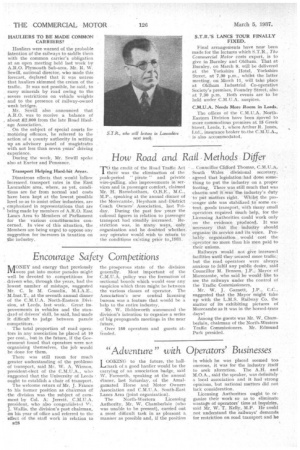How Road and Rail • Methods Differ
Page 46

If you've noticed an error in this article please click here to report it so we can fix it.
'TO the credit of the Road Traffic Act 4 there was the elimination of the peak-period " pirate " and private wire-pulling, also improvements in services and in passenger comfort, claimed
Mr. H. Rarnsbotharn, MC.. M.P. speaking at the annual dinner of the Morecambe, Heysham and -District Coach Owners' Association, last Friday. During the past few years the colossal figures in relation to passenger transport had steadily •increased. Restriction was, in many ways, only organization and he doubted whether. any oPerator would .wish to return to the conditions ex:sting prior to.1031. Councillor Clifford Thomas, C.M.U.A. . South Wales divisional secretary.
• agreed that legislation; had dorm something to put the industry on a proper footing. There was still much that was chaotic and it was the industry's duty
to put Matters right. Whilst the pas , :senger side was stabilized to some ex
tent, goods transport, With many small operators required much-help, for the Licensing Authorities could work only on the evidence produced. It was _ necessary that the industry • should organize its .service and ifs VOCE, Probably organization_ would cost the operator no more than his men paid to their unions.
Railways would not give increased . facilities until they seCured more traffic, but the road operators were always anxious to fulfil any public desire, said
Councillor M. Benson, Mayor of Morecambe, who said he would-like to • see. the railways under the control of the Traffic Commissioners.
. Mr. W. J. Garnett, J.P., suggested that the Mayor might take up with the L.M.S. Railway Co. the matter of its exhibiting pictures . of Morecambe as it was in the horsed-tram days! . Among the guests was Mr. W. Chamberlain, chairman of the North-Western Traffic Commissioners. Mr. Edmund Park presided.




































































































